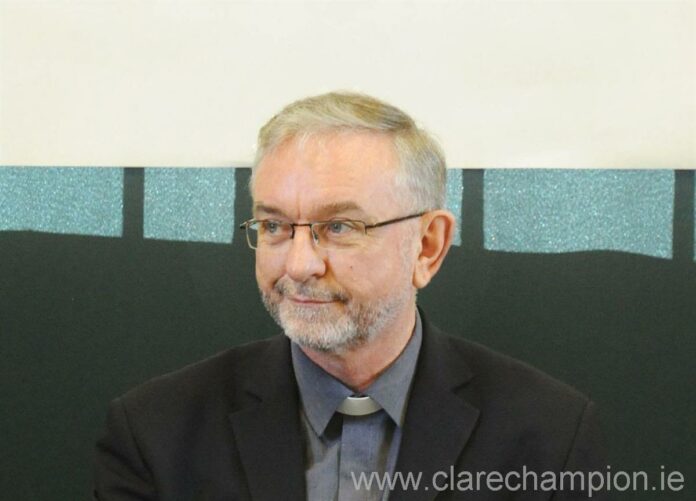An open forum, organised in protest at the now postponed imposition of the Permanent Diaconate in the Killaloe diocese, heard harsh criticism of Bishop Kieran O’Reilly from several disillusioned priests.
On August 15, The Clare Champion revealed that married men in the diocese could train to become deacons and preside over baptisms, weddings, funerals and other ceremonies. However, women cannot become deacons.
In a letter issued to parishes last weekend, Bishop O’Reilly said that, following consultations, he had decided not to proceed with the introduction of the Permanent Diaconate “at this time”.
At Monday’s forum in the Dromoland Inn, which was attended by more than 200 people, Ogonnelloe, Bodyke and Tuamgraney-based Fr Donagh O’Meara asked how and why the original decision to introduce a Permanent Diaconate was arrived at.
“I’d like to ask a fundamental question; how are decisions made in our diocese and who makes them?” he queried.
He expressed particular frustration in the light of the Killaloe diocese undertaking a “listening process” in 2013.
“I was on that listening process and there was only one time when I heard about deacons. Once. Where did that decision come from and who made it? That’s the debate that needs to happen. That’s the deeper question,” Fr O’Meara reiterated.
He said that one of the findings of the “listening process” was that women did not have leadership roles in the Killaloe diocese.
“The overriding thing that I heard was about the absence of women in leadership roles and positions in the diocese. We then subsequently came back from that and what did we do? We were supposed to have to listen but we put in another layer of men. That appals me really,” he stated.
Countering some of the criticisms, Fr Brendan Quinlivan, diocesan communications officer, claimed that this era could, in time, be viewed as the one in which vocations to the priesthood died out in the diocese.
“If we are discouraging the development of holy orders in the Diaconate, you are also discouraging the development of holy orders in the priesthood. I hope and pray that I’m not a prophetic voice here tonight,” Fr Quinlivan told the meeting.
Forum organisers, including Mary Hanley (Ennis) Martina Meskell (Clonara), Kathleen McDonnell (Cross) and Rita O’Brien (Scariff) were all incensed at the timing of the introduction of the Diaconate given that the diocese had carried out the “listening process” last year.
Kilmihil’s Fr Peter O’Loughlin was equally forthright in his comments, claiming that a climate of fear pervaded in the diocese.
“One of the things that holds us all back at times is fear. Fear is created by people who have power and very often we’re afraid to speak. I congratulate you on speaking.
“Thanks be to God, you were listened to when some of us who have tried to speak on other occasions weren’t listened to,” he said, directly addressing the meeting organisers and referring to the fact that the introduction of the Permanent Diaconate had been postponed.
Kilrush based Fr Martin Blake offered his full support to the forum committee.
“I love what you’re doing here. I love the open discussions and I think we should have more of that. I think there are more groups that the church needs to listen to and there should be more talking like this,” he said adding that he is not being heard.
“For myself I need to be listened to in my own diocese but I’m not so I think it’s great to have groups like this expressing their viewpoints and the church has to be listening as well,” Fr Blake added.
Meanwhile, Fr Brendan Quinlivan, who said that he was speaking personally, told the meeting that the Diaconate stretches back thousands of years and that people may not understand what it entails.
“I feel that this sacred ministry is rooted in sacred scriptures and goes back to apostolic times in the time of Christ. I think we may be missing an opportunity by not allowing the spirit to breathe in and through that because it is available to us in the current framework and context of the universal church,” Fr Quinlivan said.
“I think that in a lot of the discussion that has taken place and from people that I have listened to speaking, there is something of a lack of understanding in relation the nature of holy orders and sacrament. I’ve listened to definitions of sacred ministry that are actually at variance with the teachings of the Catholic Church,” he added before suggesting that the views expressed at the forum may lead to a further decline in vocations for the priesthood.
“It may not be your intended consequence but if you say that because women cannot be deacons, therefore we cannot have the Diaconate in the diocese then you might as well say that because women cannot be priests in the universal church today, that we should not accept candidates for the priesthood. That is the logical consequence of your argument. In 20 years time and 20 priests are meeting the needs of 58 parishes and people ask when did the culture of vocations to the sacred ministry die in this diocese, I’m afraid they will point to this period and this time,” he predicted.
A native of Ennis, Colin McGann has been editor of The Clare Champion since August 2020. Former editor of The Clare People, he is a journalism and communications graduate of Dublin Institute of Technology.



